aNewDomain — Some readers of the The Guardian and other media that have covered The Los Angeles Times‘ firing of cartoonist Ted Rall, have questioned why we have taken up Rall’s case with such gusto.
It isn’t just because Rall is a trusted columnist on staff here. It is because the journalists, legal experts and executives who run this publication strongly believe the Ted Rall LA Times scandal matters.
The Ted Rall LA Times scandal matters for exactly the same reasons that the First Amendment and the Due Process clauses of the U.S. Constitution matter. The scandal also matters because the police are constitutionally required to give you evidence you could use to defend yourself against any charges they make against you.
Regardless of whether you like or hate Rall, this scandal should matter to you — a lot.
Why? Because the same thing that happened to Rall could happen to you.
The Rall scandal in brief
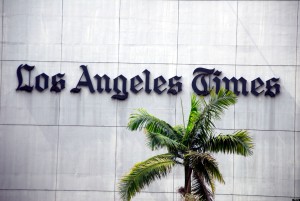
Pulitzer Prize finalist and political cartoonist Ted Rall drew cartoons for the Times for six years, an arrangement that worked out fine until, according to the Times, the LAPD contacted editors and accused Rall of lying in a May 2015 column. The column detailed his 2001 jaywalking traffic stop and told how he was handcuffed and manhandled by an LAPD officer. According to the Times, the LAPD quickly provided a 14-year-old LAPD audio tape to prove that there had been no handcuffing at all and that, certainly, there were no protesting bystanders, as Rall had claimed in the column. The Times’ issued a public note loudly announced Rall’s firing, saying it would no longer publish his comics or commentary as a direct result of the “discrepancies” it discovered in that first, almost inaudible, LAPD tape.
Three days after his July 27 firing, though, this publication helped Rall develop an enhanced version of the audio tape, which supports the version of events reported by Rall in his column. The tape actually vindicates Rall. Yet the Times didn’t take down the note, acknowledge the new information or launch its own investigation into the firing due to the terrible quality of the original recording, as you can hear here.
The Times has since refused comment, closed off reader comments on the post even as dozens of readers began to demand that Times’ leadership consider the new evidence, and earlier this week told Rall the new evidence proves … nothing.
In recent days, the Association of American Editorial Cartoonists (AAEC) has called for an investigation into the Times‘ public firing of Rall, saying that the paper “should have demanded a higher standard of proof in this matter.”
The Times‘ lack of investigation into the LAPD’s accusations of Rall — a cartoonist and blogger who had long been critical of the department — violates the Times‘ own ethical guidelines.
Whether you’re a fan of Rall’s controversial political cartoons and essays is irrelevant.
Here’s how what happened to Rall could happen to you.
Don’t think Rall’s situation applies to your own freedoms and liberties?
Think again.
Imagine a police captain comes into your place of employment, finds your boss and then tells him that you’re a liar, a liar who he wants fired.
The only evidence the police present to your boss is a 6 minute, 20 second audio dub, fully six minutes of which is incomprehensible noise and static. But the 20 seconds on there, well, they kind of support what the officer is saying.
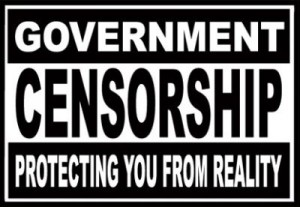
The boss calls you and tells you the tape supports the captain’s claim that you lied, and it sure doesn’t support any denials you give him.
And so the boss fires you. He makes no attempt to use commonly available tools to try to enhance the tape or otherwise investigate.
Then your former boss starts blogging. He announces the company is firing you in a very public way, a way that is sure to let everyone in your industry find out what you’ve been accused of. It’s a post that questions your integrity in the face of such “evidence.” It announces you are fired.
Now, regardless of the truth, it is clear to everyone who matters: You cannot be trusted.
So how will you defend your reputation? You can’t tell anyone at work, because you are fired.
Will anyone ever hear your story if you do choose to loudly proclaim it on social media or on a media site that will help you defend yourself, like this one?
If you pay $1,000 or more to enhance the audio and discover it in fact does support your side of the story, how will anyone find out about that?
And if the boss won’t concede there is new evidence or make a move to independently enhance the tape, what will you do then?
This is Rall’s predicament.
Would you really want to live in a country where such things happen? By the way, you’re likely to never be hired in your field again because, guess what, no one will ever trust you again.
Don’t assume that it can’t happen to you because you’re not a caustic leftie cartoonist.
If it could happen to Rall, it could happen to you for almost any reason under the sun.
Maybe you’re name is Buttle not Tuttle. Maybe your wife is hot. Maybe someone is jealous of you or some competitor who’d like to see you gone has a friend at the station and just wants you out. For any reason.
It could be anything.
The First Amendment violated: Chilling the media
Now, the Times could have just quietly told Rall it would no longer carry his cartoons. It didn’t. It could have simply told Rall that it wanted to go in a different editorial direction or just simply terminated his freelance agreement for any reason, lack of trust in him, included. After all, he was a freelancer — an employee, to be sure, but not a salaried one. The Times didn’t do any of this.
Rather, it chose the nuclear option and went about the task of publicly humiliating him.
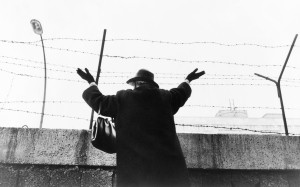 The editors of the Times saw fit to tell the world that Rall had lied. The Times is the fourth-largest newspaper in the U.S., with a daily circulation of nearly 700,000, a million on Sunday, and an even wider online presence.
The editors of the Times saw fit to tell the world that Rall had lied. The Times is the fourth-largest newspaper in the U.S., with a daily circulation of nearly 700,000, a million on Sunday, and an even wider online presence.
And the Times made sure that at least one million people were informed that Ted Rall was a journalist who had lied in print and he would no longer be working for the Times because of it.
As we now know, the primary evidence against Rall was a nearly inaudible tape of Ted’s jaywalking stop. So, the Times decided to trash this journalist’s reputation on the basis on a nearly inaudible tape — rather than opt for a quieter response.
We now know that an enhanced version of the audio recording fully supports Ted’s version of events. Listen to it here.
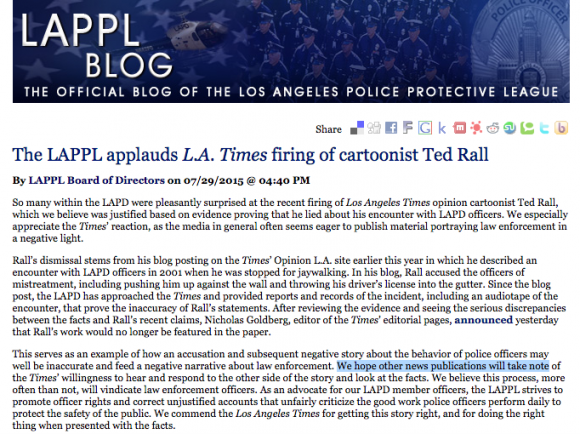 What message does this episode send other journalists?
What message does this episode send other journalists?
The message sent to other journalists is known as a chilling effect. Don’t make waves if you want to be a journalist here.
Within a day of Rall’s firing, the Los Angeles police union (the Los Angeles Police Protective League, or LAPPL) let other journalists know about the example that had been made of Rall in a big way. It posted a congratulatory note on the LAPD.com blog, advising other media to take note, saying that the firing,
… serves as an example of how an accusation and subsequent negative story about the behavior of police officers may well be inaccurate and feed a negative narrative about law enforcement. We hope other news publications will take note of the Times‘ willingness to hear and respond to the other side of the story and look at the facts.”
The LAPPL has since removed that post, but not before sending it out as a press release to the media on its PR list, which at this writing is still readable here.
The message: If you write critical articles about the police and the police don’t care for the criticism, you will lose your job.
Better still, never write anything bad about the police, government or any other agency that might get angry — ever. “Hey, they’re great! And we’re lucky to have (the police, the government agency, the winning politician, etc.), and you should be grateful, too.”
Is this really the future of Americans’ First Amendment rights?
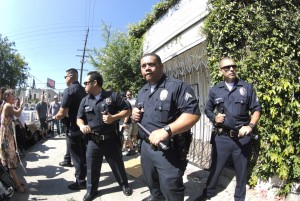 Just think of all the powerful people over the years brought to justice by evidence uncovered by journalists. Under this new paradigm, the powerful have a huge, extra layer of protection against American citizens.
Just think of all the powerful people over the years brought to justice by evidence uncovered by journalists. Under this new paradigm, the powerful have a huge, extra layer of protection against American citizens.
Do we really not want the media to ask no questions about the deaths of Tamir Rice, Eric Harris, Walter Scott, Freddie Gray, Samuel DuBose and Sandra Bland?
Do we really want the press to avoid covering, for instance, gross police misconduct like what was revealed in the Rampart Scandal, which led the Department of Justice to take over management of the LAPD for most of the 2000s?
Um, no.
If “happy news only” is the kind of press that we end up with, will we be any different than the media of countries that we complain don’t have freedom of the press? Nope.
I used to travel around the world a lot on business. I’ve read government-run newspapers from dictatorships around the world, and one thing that all those papers have in common is happy news. It’s really happy stuff regardless of the gulags that the regime is running. In fact, I’d go so far as to say that happy newspapers are a sign of a dictatorship.
Actually, you kind of have to wonder, in such a world, how long a newspaper or any media outlet would last if it only published puff pieces about the powerful and never fulfilled its Fourth Estate charter to inform people and ask questions about the organizations and people who rule us.
Even people who might think that’s the sort of paper they want to read would soon not bother reading the news.
The Times seems not to worry at all about the enormous implications of its actions with Rall.
Its cavalier attitude regarding the import of the Ted Rall LA Times scandal is especially strange considering that this Pulitzer Prize-winning news outlet repeatedly has spent millions of dollars over the years defending its cartoonists and columnists. Defending them, that is, from the accusations and lawsuits of government officials and other organizations who have tried to silence them.
Of course, none of those brave defenses of journalists happened under the Times present ownership.
If it turns out that only the Times is involved in the Rall scandal and that the police, per se, weren’t actually involved, then you really have to wonder why a newspaper wants to send a message to its own staff to stop doing what has historically been the mission of a newspaper.
 The potential due process violations
The potential due process violations
The due process clauses exist under the Fifth and Fourteenth Amendments of the U.S. Constitution to provide a safeguard against the denial of life, liberty, or property by the government outside the sanction of law.
Other than what the Times told Rall and what it printed in its public note about the firing of Rall, we don’t know precisely the chain of events that caused the Times to fire Ted.
In one version of the story that Times‘ cop reporter, Paul Pringle, told Rall, the LAPD came to the Times first, accusing Rall of lying in his May 11, 2015 column about the jaywalking arrest.
Aside from the note, Times editors refuse comment. The LAPD has also so far not commented, except to tell investigative journalist Greg Palast, that it could not confirm that it pulled the 14-year-old tape at all.
So, there was almost no evidence that Rall had lied, before his bosses fired him and publicly embarrassed him in front of his industry, all his potential employers, other media outlets that use his material and all his readers. We begin to see a problem. It’s a big one.
In the absence of any real evidence whatsoever and by the Times own description of what happened, here’s one possible conclusion: The LAPD simply asked the Times to fire Ted.
If that happened, the LAPD effectively deprived Rall of his employment with the Times outside the sanction of law. And it doesn’t matter if he was a freelancer or a W9 employee.
Rall lost a six-year-old job that regularly employed him and paid him. And the public notes posted on the Internet by both the Times and the LA Police union (LAPPL) on the LAPD.com site virtually ensure he might never be hired again.
Integrity is the life blood of any journalist or columnist. Without the ability to convince editors and readers they can trust you, a journalist has practically nothing to offer a news media outlet.
No agency of government is allowed to deprive a citizen of their employment without due process, and in Rall’s case there was none. If contrary to the Times explanation, the LAPD wasn’t involved, then the due process issue goes away. We’ll eventually know who did what and when.
No one but the police or the involved officers could have known that the 2001 Rall police tape even existed.
What other tapes does the LAPD or other police agencies have that Americans don’t know about and could use to defend themselves?
The LAPD, or someone else with access to police files who the Times believed to be the LAPD, provided the Times with a copy of an audio tape of a traffic stop recorded 14 years ago.
This audio tape was apparently provided to the Times within a few weeks of Ted’s May 11, 2015 column about his jaywalking traffic stop. Rall received his first call about it from the Times‘ cop beat reporter Pringle three days before his July 27, 2015 firing.
How were the police able to access that secretly recorded and filed police tape so quickly?
The LAPD, in its handbook, does permit police to record stops for individual purposes, but various California rulings clearly show that they are not for public use.
But this one was. And it was easily accessible.
Now just think of all the thousands — or millions — of traffic records that had to be sorted through très vite to find a 14-year-old audio tape of a jaywalking stop by one particular officer?
That’s staggering efficiency, isn’t it? That ability to just pull it so rapidly after Rall wrote his May 2015 column about that 2001 incident is just incredibly, even eerily, efficient.
So how did the LAPD do that?
How many recordings of traffic stops — and potentially, other bigger arrests of far more import to police — exist? How many would have exonerated the persons who were stopped and ticketed or arrested throughout the years, persons who perhaps wanted to complain but never thought their version of the story would stand up well against that of a police officer?
How many of the persons who were stopped were aware that they were recorded? That answer is easy: Probably none of them.
The LAPD should provide notice to everyone whose traffic stop they have recorded and give that person an opportunity to review the secretly recorded audio tape. Of course it should.
How many other recordings does the LAPD have in its files whose revelation might cause a revision of long-settled court cases?
This sounds like the makings for an interesting class action lawsuit, does it not?
At the very least, the Times’ firing and public denouncement of Rall on what it claims was the behest of the LAPD, was based on faulty evidence. But when you look deeper, it’s clear the issues at stake here are much bigger than Rall, the Times or the LAPD. It’s about civil liberties. And those are always worth fighting for.
For aNewDomain, I’m Tom Ewing.
Reporter Gina Smith contributed to this story.
Photo credits:
Cover image:”2014 Cenzura” by Jacek Halicki – Own work. Licensed under CC BY-SA 3.0 via Wikimedia Commons; “120310censorship” by Helodrgt – Own work. Licensed under CC BY-SA 3.0 via Wikimedia Commons.”Winken ueber die Berliner Mauer“. Licensed under Public Domain via Wikimedia Commons; “Schedel livros“. Licensed under Public Domain via Wikimedia Commons.

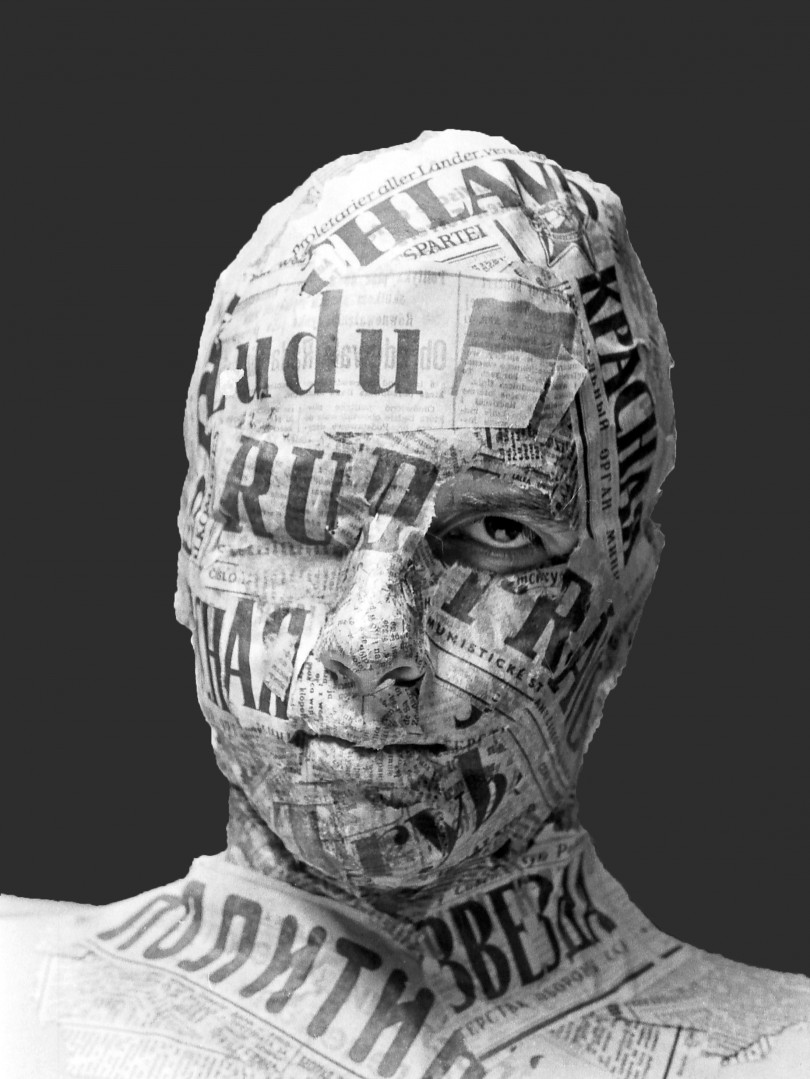












Excellent analysis, Tom.
Wrong. The important issue is the Times’ abdication of its sacred trust as a member of the press: the people’s watchdog, speak truth to power.
The Times has shown itself to be the modern avatar of the worst house organs of history.
Inexcusable.
Goldberg, Pringle, et al, need to go, or stick to comics and gardening.